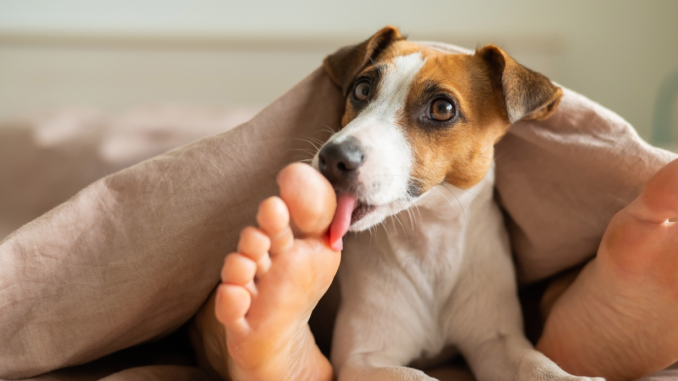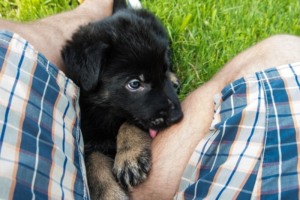
If you’ve ever caught your dog licking your legs, you might have wondered, “Why do they do that?” It’s not uncommon for dogs to show affection, curiosity, or even anxiety through licking, but when it’s directed at your legs, it can leave you scratching your head.
This behavior, although often seen as cute or endearing, can sometimes be puzzling. Whether it’s a quick lick after you’ve come home or a repeated action that happens throughout the day, understanding why dogs lick can provide insight into their emotional state and overall health.
In this article, we’ll explore the reasons behind this peculiar behavior. From affection to anxiety, we’ll break down the most common reasons your dog might be licking your legs and what you can do about it.
What Does It Mean When My Dog Licks My Legs?
1. Affection and Bonding
One of the most common reasons dogs lick their owners’ legs is simply as an expression of affection. Dogs are social animals, and licking is a natural way for them to show love and strengthen bonds. Just as a mother dog licks her puppies to groom and comfort them, your dog might lick your legs as a way to show that they care for you.
Dogs view their owners as part of their pack, and licking your legs is one way they demonstrate attachment. If your dog is particularly affectionate, this behavior can be a sign of their deep connection to you.
2. Attention-Seeking Behavior
Dogs are expert communicators, and licking can also be a way for them to get your attention. Whether your dog is hungry, wants to play, or simply craves some love, licking your legs can be their way of signaling that they need something from you.
If your dog licks your legs and you respond by petting them or giving them a treat, they may quickly learn that licking gets them the attention they desire. Over time, this behavior could become more frequent as they associate licking with rewards.
3. Anxiety or Stress
Sometimes, dogs lick their owners’ legs as a coping mechanism for anxiety or stress. Just like some humans might bite their nails or tap their feet when they’re nervous, dogs use licking as a way to self-soothe.
If your dog is feeling anxious—whether it’s due to separation from you, a change in routine, or unfamiliar environments—licking may be their way of calming themselves down. If this behavior is accompanied by signs of stress, such as pacing, drooling, or hiding, it’s worth considering the emotional state of your dog and finding ways to alleviate their anxiety.
4. Grooming Behavior
Another common reason your dog might lick your legs is related to grooming instincts. In the wild, dogs lick each other as part of their grooming routine to keep each other clean. Even domesticated dogs often exhibit this instinctual behavior. By licking your legs, your dog might simply be trying to “clean” you, as they would a fellow canine.
If your dog is particularly interested in licking specific areas of your legs, such as spots with dirt or sweat, it could be their way of helping you stay “clean” in their eyes.

5. Taste or Scent Attraction
Believe it or not, your legs might just taste or smell good to your dog! Dogs have an extraordinary sense of smell and taste, and they are often drawn to specific scents or flavors. If you’ve recently applied lotion, been outside, or even sweated a bit, your dog might be licking your legs because they are attracted to the scent or taste on your skin.
Some dogs are particularly drawn to salty tastes, so after a workout or a long walk, your dog might be licking your legs for a little salty treat. This behavior is often more noticeable in hot weather or after exercise when you’re sweating more.
6. Medical Conditions or Discomfort
In rare cases, excessive licking of your legs could be a sign of a medical condition or discomfort. Dogs that are in pain, suffering from allergies, or experiencing digestive issues might lick certain areas of their owner’s body as a sign of discomfort.
If your dog is constantly licking your legs or seems to be focused on one particular spot, it’s worth considering whether there could be an underlying health issue. Look for other signs such as limping, lethargy, or a change in appetite. If you’re concerned, it’s always best to consult with your vet to rule out any potential medical conditions.
When Should You Be Concerned About Licking Behavior?
Excessive Licking: A Sign of Compulsive Behavior
While occasional licking is completely normal, if your dog’s licking becomes excessive, it could indicate a behavioral issue. Dogs with compulsive licking habits may engage in the behavior over and over, even when there’s no apparent reason for it.
If your dog’s licking behavior is constant, interrupting their daily routine or causing distress, it may be time to seek advice from a behaviorist or veterinarian. Compulsive licking can be associated with anxiety, stress, or even boredom, and it’s important to address the root cause of the issue to help your dog feel more at ease.
Licking Accompanied by Other Symptoms: Health Concerns
If your dog’s licking is accompanied by other troubling symptoms—such as loss of appetite, vomiting, diarrhea, or changes in behavior—there could be an underlying medical issue that requires attention. Dogs with allergies, infections, or digestive problems may lick their legs or other body parts in an attempt to find relief.
If you notice that the licking is consistent with other signs of illness, it’s important to schedule a vet appointment as soon as possible.
How Can I Respond to My Dog’s Licking?
1. Reinforce Positive Behavior
If you enjoy the affection and attention your dog is giving you by licking your legs, there’s no harm in letting them express themselves this way. However, if you don’t want them to lick you, it’s important to set clear boundaries. If your dog licks you and you want to discourage the behavior, try turning away or gently moving them away when they start licking.
Reinforce the behavior you do want, such as sitting calmly or engaging with you in a different way. By redirecting your dog’s energy and attention, you can help them learn which actions are acceptable and which are not.
2. Provide Alternative Outlets for Anxiety
If your dog’s licking is a result of anxiety, consider introducing relaxation techniques and environmental changes to reduce stress. Providing a comfortable space, such as a quiet bed or crate, can help your dog feel more secure when they’re feeling anxious.
Training your dog with positive reinforcement methods, such as offering treats for calm behavior or using puzzle toys to distract them, can help alleviate anxiety and reduce the need for excessive licking.
3. Check for Medical Issues
If you suspect that your dog’s licking might be related to pain or discomfort, it’s important to have them evaluated by a vet. They can rule out any potential health problems, such as allergies or infections, and provide you with advice on how to best address the issue.
A vet may recommend medications, dietary changes, or treatments to help ease your dog’s discomfort and reduce excessive licking.
Conclusion: Understanding Your Dog’s Licking Behavior
In most cases, when your dog licks your legs, it’s simply a way of showing affection, seeking attention, or responding to a specific scent or taste. However, if the behavior becomes excessive or is accompanied by signs of stress or illness, it’s important to take a closer look at the potential causes.
By understanding why your dog licks and responding appropriately, you can strengthen your bond with them and ensure they’re happy and healthy. Whether it’s a sweet gesture of love or a sign of anxiety, the more you know about your dog’s behavior, the better equipped you’ll be to address their needs.
FAQs About Dog Licking Behavior
1. Why does my dog lick me when I come home?
Your dog is likely showing excitement and affection. Licking can be their way of greeting you and expressing joy after a period of separation.
2. Can licking be a sign of allergies in dogs?
Yes, excessive licking can sometimes indicate allergies or skin irritation. If your dog is licking one specific area repeatedly, it’s worth consulting a vet.
3. How can I stop my dog from licking my legs?
You can discourage licking by gently redirecting your dog’s attention to other activities, providing them with toys, or offering treats for calm behavior.
4. Is licking a normal behavior in dogs?
Yes, licking is completely normal and is a common way for dogs to show affection, groom, or self-soothe.
5. When should I consult a vet about my dog’s licking behavior?
If the licking is excessive, if it’s accompanied by other signs of illness or stress, or if your dog is focusing on one specific area of their body, it’s a good idea to consult a vet.
